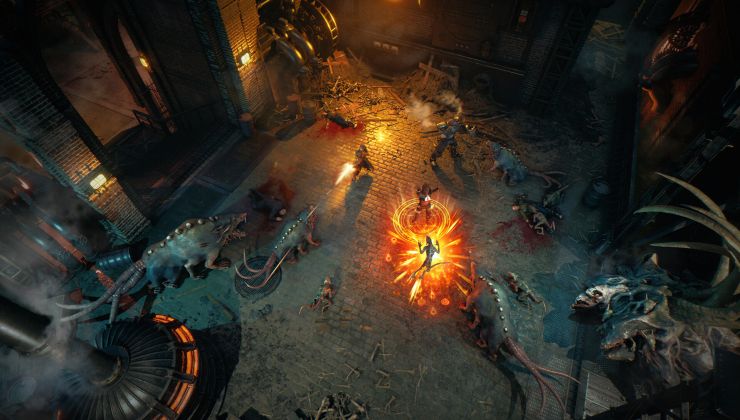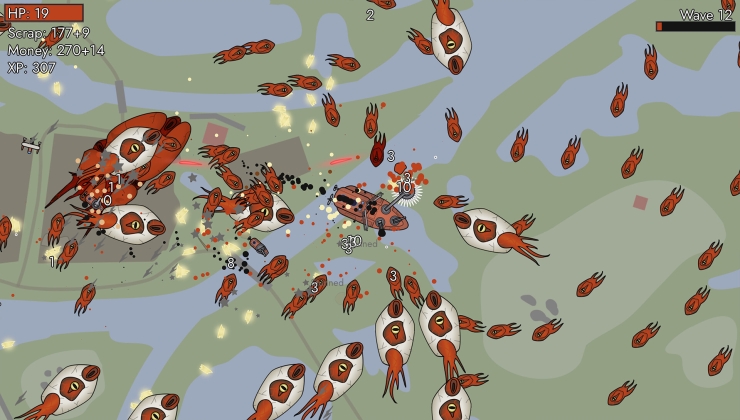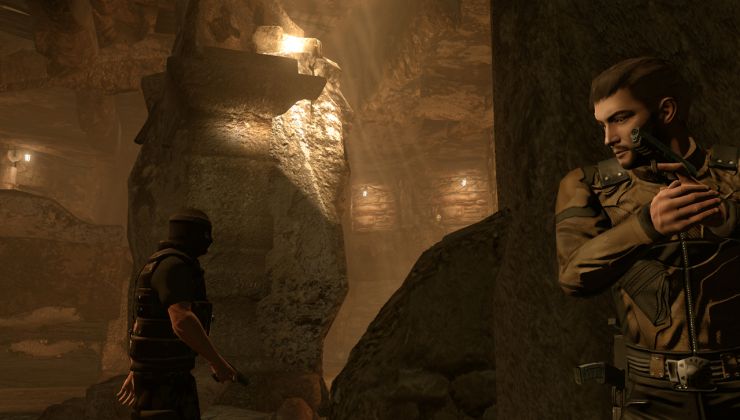Valve has now officially released SteamOS 3.6 for Steam Deck to the stable channel, bringing with it lots of big improvements all across the system. It's been in testing since May, so this one really did take a while to get it right.
Officially it's SteamOS 3.6.19, the same as the last Beta release. There's so many improvements like a big update to the graphics driver with improved performance across lots of games, improved reliability of microSD cards, a Linux kernel update, Mura Compensation, Bluetooth improvements, KDE Plasma 5.27.10 Desktop Mode update, support for some HDMI CEC features in the Docking Station and much more.

The full changelog is below:
General
- Updated to a more recent Arch Linux base, and updated Linux kernel to version 6.5
- These updates improve hardware compatibility, system performance, security, and overall system stability
- Improved speed of subsequent OS updates
- Improved reliability of certain microSD card usage scenarios
- Worked around misdetection of some SanDisk microSD cards
- Improved responsiveness of session restart in case of session crashes caused by certain GPU errors
- Fixed an issue where certain games could crash with a 'page allocation failure' after a long play session
- Improved recovery from situations where the Steam installation could get corrupted
- Fixed some connectivity failures with access points supporting WPA3 security
- Fixed a problem where Steam Deck would be unable to connect to certain Wi-Fi 7 access points
- Fixed game session cursor offset alignment
- Fixed an issue where a thin grey line could appear at the bottom of the screen during boot in some situations
- Fixed an issue where the Performance Overlay would spuriously enable itself under certain conditions
- Fixed an issue preventing sleep on some types of aftermarket SSDs
- Fixed an issue preventing update checks from working properly on networks with an invalid IPv6 configuration
- Fixed an issue where touching the left trackpad after sleep could result in a spurious haptic click
- Fixed a general issue affecting OLED units on 3.5, causing a slow memory leak during gameplay
- Fixed an issue causing a "Update Error" message when attempting to interact with the update menu on the 'Preview' update channel.
- Fixed the frame limiter not properly applying in certain situations
- Fixed an issue where block corruption could appear on screen on certain state transitions
- Fixed an issue where updating the built-in controller firmware could result in a blank screen during boot
- Fixed a rare issue where sound output could be corrupted on certain boots
- Fixed a rare issue where 3.5mm headphones could produce elevated background noise on reconnection until next sleep/resume
- Fixed an issue where updates would sometimes be applied incorrectly if the unit was powered off abruptly near the end of an OS update
- Fixed an issue with copy-pasting UTF-8 text across applications
- Fixed a problem where a Game Recording capture failing could cause subsequent captures to also fail
- Fixed a crash when using the magnifier tool while game recording is active
- Fixed colorspace for Game Recording
- Fixed an issue where colors could appear washed out when using Steam Remote Play as a client
- Fixed a possible crash when using Steam Deck as the Remote Play host
- Fixed an issue that could cause videos to stutter in titles such as BlazBlue Centralfiction
- Fixed an issue with a rare session crash during early startup of ELDEN RING
- Fixed display regressions with certain titles such as Warriors All-Stars, Disgaea 5 Complete, Vampire: The Masquerade - Reckoning of New York
- Worked around a bug where HDR couldn't be selected in Halo Infinite
- Fixed an issue causing temporary files to accrue when using Flatpak
- Security fix for Flatpak (CVE-2024-42472)
Graphics and Performance
- Updated graphics driver to Mesa 24.1, with many performance and other improvements
- Improved responsiveness of the Steam UI
- Improved performance and stability in memory pressure situations
- Slightly improved cold boot time
Display
- Improved display uniformity, under some conditions (Mura Compensation)
- Improved display color balance (reduced green tint) at lower brightness levels, under some conditions
- Improved gamma uniformity (yellow tint), under some conditions
- Fixed certain specific refresh rates failing to apply on the OLED Limited Edition model
- Fixed an issue where the internal display could remain blank after disconnecting an external display
- Fixed an issue where internal display could be abnormally limited to a lower frame rate after disconnecting an external display with VRR enabled
- Fixed rare situations where switching to Desktop Mode or back could result in a blank screen, or wrong colors
External Display
- Fixed several issues where an external display could remain blank after resuming
- Fixed an issue where an external display could remain blank if its mode required chroma subsampling
- Fixed an issue where the system could crash on wakeup if an external DisplayPort monitor was connected
- Fixed a system crash when hotplugging a second display in Desktop mode
- Improved frame pacing with VRR on external displays
Bluetooth
- Improved pairing experience with Apple AirPods
- Enabled support for Bluetooth HFP and BAP profiles
- Added mechanism to configure which Bluetooth device categories are allowed to wake the system from suspend
- By default, controllers are the only devices that can wake the system from sleep
- Finer-grained UI configuration options will be available as part of a future update
- Improved connection speed of some Bluetooth devices
- Fixed an issue where Bluetooth peripherals would disconnect on session switch
Input
- Added support for extra ROG Ally keys
- Added support for the ASUS ROG Raikiri Pro controller
- Added support for the Machenike G5 Pro controller
- Added support for the Steam Deck motion sensors to the built-in non-Steam kernel driver
- Fixed an issue where scroll wheel Steam Input bindings weren't functional
- Fixed an issue where DualShock 4 and DualSense controllers would sometimes not function properly on their first connection
- Fixed calibration on some third-party DualShock 4 controllers
Desktop Mode
- Updated to KDE Plasma 5.27.10
- Enabled thumbnail previews for videos in the file browser
- Fixed an issue with desktop use that could cause subsequent microSD card auto-mount to fail
- Fixed Zenity dialog boxes
- Fixed nested desktop crashing on launch
BIOS / Firmware
- Adjusted power LED slow charging threshold
- Fixed not being able to set the SDCard as default boot device
- Fixed spurious power LED blinking in S5
- Steam Deck OLED only
- Added support for the Windows Bluetooth driver (LCD models already have Windows Bluetooth support)
- Steam Deck LCD only
- Improved battery life by up to 10% in light load situations
- Added overclocking controls
Steam Deck Docking Station
- Added support for some HDMI CEC features:
- TV remote input
- TV wake up
- TV input switching
- Updated Dock firmware, with compatibility fixes for high-refresh-rate VRR displays, and fixing several issues where displays could remain blank
Development and Modding
- Modified files in /etc are now migrated to new OS versions based on a whitelist
- Fixes numerous issues with incidentally touched /etc files becoming 'sticky' and persisting unexpectedly
- Additional whitelist entries can be added via config fragments
- See /etc/atomic-update.conf.d/example-additional-keep-list.conf
- Added /etc/previous/ containing modifications from the previous update to prevent unexpected data loss
- Up to five previous snaphots of /etc modifications will additionally be retained in /var/lib/steamos-atomupd/etc_backup/
- Added support for {ssh,sshd}_config fragments
- Split package reinstallation step out of `steamos-devmode` command and into new `steamos-unminimize` command. `steamos-devmode` now simply enters read-write mode and initializes the pacman keyring for use, and is much quicker.
- openssh: Fix remote code execution bug (CVE-2024-6387)
Taken from the changelog.

What's your favourite part of this update and what are you hoping to see in SteamOS 3.7?
It strikes me as one of those issues that people who look at their screens with a magnifying glass obsess over.
Well it isn't. I never found myself caring much about display related oddities until I started being bothered by the permanent film grain effect darker games had on my OLED model, did some research and found out it was a very real phenomenon called Mura. The fact Valve actually addressed this in an update is telling enough, so far I'm not noticing much of an improvement however.
Last edited by ambrosia_enjoyer on 25 October 2024 at 11:32 am UTC
Looks like I'm gonna be reformatting it now.
Yup, I'd rather have older stuff that works properly than bleeding edge with tons of bugsNice, but I wonder why they didn't go with Mesa 24.2. Mesa 24.1 is already quite old at this point.As a Linux user, you should know that "old" means "thoroughly tested and stable".
That's the opposite of what people guessed why Valve's using Arch now, though.
Yup, I'd rather have older stuff that works properly than bleeding edge with tons of bugsNice, but I wonder why they didn't go with Mesa 24.2. Mesa 24.1 is already quite old at this point.As a Linux user, you should know that "old" means "thoroughly tested and stable".
That's the opposite of what people guessed why Valve's using Arch now, though.
I don't know what "people guessed".
I do know what I guessed:
Valve is/was trying pull a bunch of sprints to compete with Microsoft, Nintendo, Asus and Sony and as such needed to do a lot of innovation.
Why is this easier: faster release cycle and access to the latest and greatest software ready to break on a first moments notice.
I think you're right though in your statement that this could indicate a change in policy.
Maybe they think they've catched up with the competition and are trying to slow down to a stable walk.
We've seen more tactical changes of Valve in the recent past.
Developing features for SteamOS on other devices than the SteamDeck.
ARM investments.
VR tests.
I suspect they plan to release a non-steamdeck vr device running ARCH/GNU/LINUX/Aarch64 and don't want to invest too heavily on SteamDeck maintenance in the future.
Also I severely disagree with @Stella.
Stability is something sysadmins salivate over, but there are lots of other parties like Gamers and developers that don't care about stability and want the newest of the newest tools.
These people are Linux users too and actually pretty useful for these same sysadmins(from the perspective of a sysadmin these people are testers), but they don't know and don't care that it means "well tested".
This is why we have beta releases in the first place.
Once the code passes its development(alpha) tests we throw it to a group of people who don't care about occasional breakage as long it works most of the time and get their crash rapports and patch them.
This is how the xz-backdoor was found and this is why most "beginner friendly" distros are rolling release(they need all kind of cutting edge stuff to look like windows/mac and they were apparently willing to risk losing their data and bricking their computer).
It's also one of the many ways we make certain the "tide lifts all boats".
The people who need software stability get cheap testing and the people who need cutting edge tools get enterprise grade software for cheap(so those enterprises don't have to deal with the bugs).
Stability is something sysadmins salivate over, but there are lots of other parties like Gamers and developers that don't care about stability and want the newest of the newest tools.That's such an absurd thing to say. I wouldn't want to work with a developer who doesn't care about stability. Nor would I want to be their customer.
And as a gamer, I don't see why I'd want anything but a stable and predictable platfrom to enjoy my games on. That's actually one of the reasons I run Linux.
Stability is something sysadmins salivate over, but there are lots of other parties like Gamers and developers that don't care about stability and want the newest of the newest tools.That's such an absurd thing to say. I wouldn't want to work with a developer who doesn't care about stability. Nor would I want to be their customer.
And as a gamer, I don't see why I'd want anything but a stable and predictable platfrom to enjoy my games on. That's actually one of the reasons I run Linux.
First:
You're right to be upset I phrased this really poorly, sorry for that.
Second:
For the developers.
I meant for their own system.
Producing stable software is an admirable goal a lot developers have, but especially for those an unstable distro is a good system to develop on.
The best way to produce a stable outcome is to develop it in an unstable environment until it stays stable even in such harsh conditions(ever changing dynamic libraries, buggy drivers, etc).
For the gamers:
Here I was even worse(, to in the level this is in retrospect actually irrelevant for the point I was trying to make).
I didn't define the level of stability.
You want your system to never crash, lag or experience trouble, while in use.
There a lot of situations when your system isn't in use and you've no issue with it crashing, updating and generally figuring stuff out.
The kind of stability I was referring is the kind NASA or a big cloud provider needs: fire and forget.
There's not a situation the system isn't in use and as such we can't have reboots for updates, we can't have any data corruption ever, etc.
Also for both I threw them in big boxes that don't correspond to everybody in that group.
The point I was trying to make is that stability is just a single feature and one that thanks to the different requirements of different people isn't always the one with the most priority especially when it costs functionality and this isn't bad, but good because we've devised ways to make them benefit from each other.
I failed at that, but now you can at least see a second attempt.
Last edited by LoudTechie on 28 October 2024 at 2:43 pm UTC








See more from me